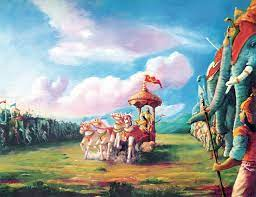The month of October got a good start with Gandhi Jayanti on October 2nd. I'm especially moved this year by the celebration of Mahatma Gandhi's birthday. Mahatma Gandhi promoted "ahimsa" - non-violence. He led a Satyagraha movement.
Satyāgraha (Sanskrit: सत्याग्रह; satya: "truth", āgraha: "insistence" or "holding firmly to"), or "holding firmly to truth",[1] or "truth force", is a particular form of nonviolent resistance or civil resistance. Someone who practises satyagraha is a satyagrahi.
In January, I posted about the Ukraine war. These days, I am posting about the October 7th 2023 attack in Israel. In shock and with great sorrow I watch the news from the comfort of my home. In this age of telecommunications, graphic images appear instantaneously for us to see in real-time - something that could not have happened in WWII when my parents were imprisoned in German concentration camps. But does this new technology help us in any way? Does it instead lull us to sleep, saddened, but ineffective? Gandhi understood the challenges of new technologies when he spun and wove, using a "charka" - a hand-operated spinning wheel when the great automated spinning and weaving factories were transforming the culture of India and the world. He understood the power plays of the mighty and protested with the Dandi Salt March symbolically extracting salt from the ocean.
In the process of aging, I reflect more and more on Gandhi, who was one of the heroes of my youth. As time marches on, I remember more and more of my youth, while I forget where I have put my glasses or car keys on a daily basis. It's well known that a senior's long term memory gets better than short term memory. This is a personal reflection - I am doing some personal life review about how Mahatma Gandhi became an important influence in my life.
Gandhiji came into my awareness initially in the 1960s during the civil rights movement in the USA, when Martin Luther King Jr. led a movement emulating Mahatma Gandhi's non-violent principles of civil disobedience against injustice. Living in Canada, we were not untouched by what was happening south of the border. I also had a regular correspondence with a friend studying in Berkley California, a hot spot of civil rights action in those days - especially in protest against the Vietnam War.
In my first year of college, my English professor introduced me to two core Indian texts - the Bhagavad Gita and the Upanishads and the Autobiography of a Yogi by Paramhansa Yogananda. Something about this literature resonated with me, as if I had uncovered long forgotten knowledge. It awoke in me a desire to "return" to my India, though I had never been there and was born into a family which had no association with that country or its culture.
My parents were keen that I should be a well-informed person about the wider world. But my fascination with India was completely unexpected. Determined at a young age to return there, I made an overland expedition to India in 1965-66. The India-Pakistan war at that time did not deter me, though it frightened my family. In India, I sought out the :"khadi" shops, searched for books by Gandhi.
"Khadi" is homespun cotton cloth. While my first sari was made of factory woven cloth, when I settled later in India during the 1970s, I chose a khadi sari which was quite impractical. Living simply in the rural area around Haridwar by the Ganges river, I washed my clothes by hand, Indian style. Khadi was heavy, took longer to dry, and did not wrap elegantly or comfortably. But I wore it with pride, as if somehow it connected me with the spirit of my hero - Gandhiji.
Wistfully, I wonder what has happened to that spirit. Perhaps this reflection on choosing khadi may seem quite petty in the face of the violence of our times and the devastating humanitarian crises that ensue. But it actually points to a need to return to the principle of simplicity, non-violence, and a spirit of collective co-operation, rather than a war-like mindset.

